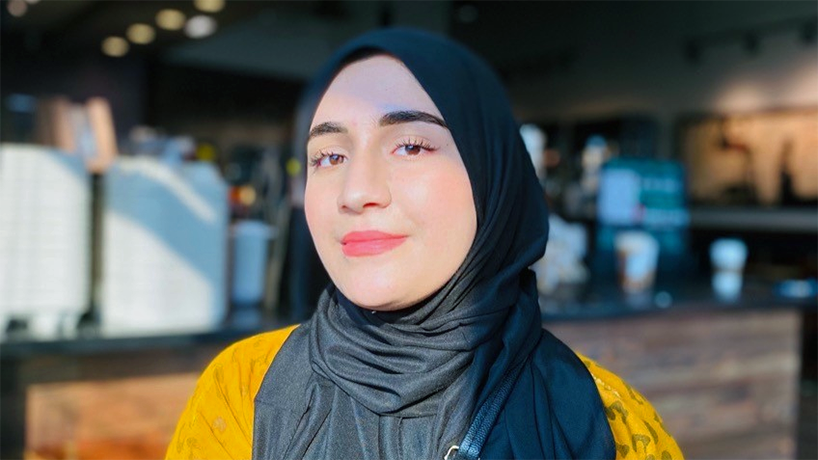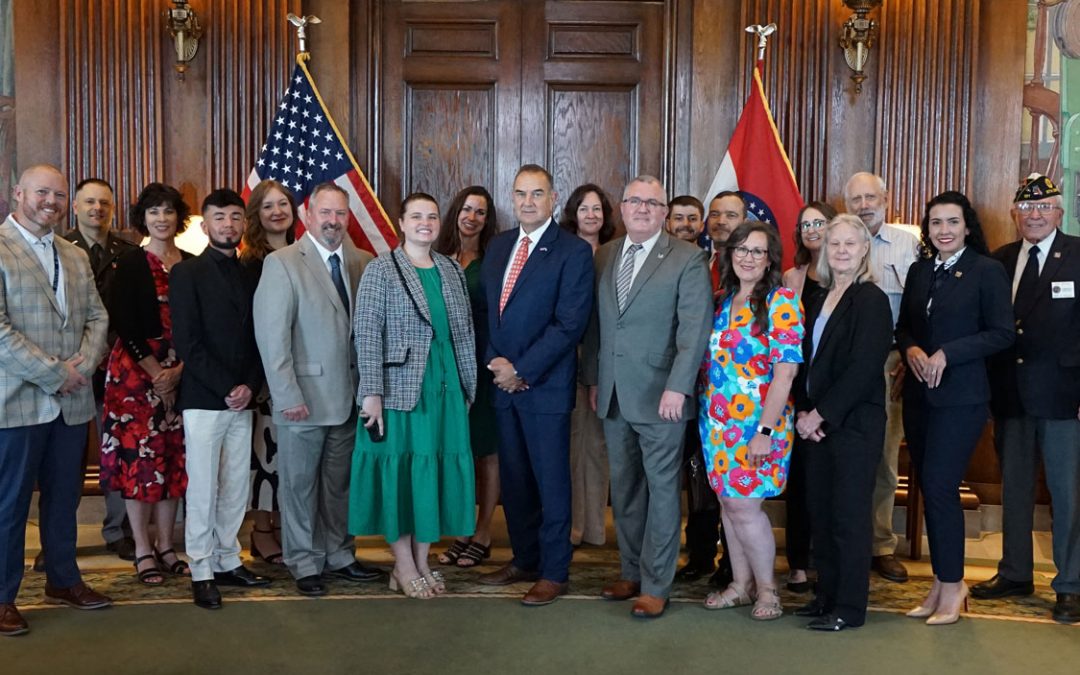
Honors College and biology student Heela Momand is driven by her past to become a doctor and wants to do so as a visible hijab wearer in order to change perceptions and be there for other Muslim women. She immigrated to the U.S. from Afghanistan five years ago. (Photo courtesy of Heela Momand)
When Heela Momand thinks of Afghanistan, she pictures walking through the bazaars of Kabul with her father during Eid al-Fitr, the celebration that marks the end of Ramadan fasting, when her family would purchase new clothing.
All around them vendors display colorful, traditional Afghani clothing and jewelry; the scents of street food waft in the air; and the streets bustle with people.
“It made me so happy,” she said. “Just like the hustle of the bazaar, people all around you, the hospitality. You could go to someone that sells cheap food and offer them money. They’d say, ‘Oh, you’re this neighbor,’ or ‘I know you from here. I’m not going to take the money.’”
Momand immigrated to the U.S. via Pakistan five years ago after leaving Afghanistan in 2012. Her family was forced to flee the country after her father, who worked for a women’s empowerment organization, received death threats from the Taliban. She’s now a student and an Opportunity Scholar at the University of Missouri–St. Louis and pursuing a biology degree in the hopes of becoming a doctor and bettering lives.
Afghanistan is bittersweet for Momand. She points to the culture, the beautiful villages and clothing, food and a history that’s often overlooked in Western depictions. In the other hand rest all the reasons she and her family had to leave and the life she’s building in the U.S. despite feeling culturally lonely at times.
“No matter where you are in the world, the place you were born, your people, your relatives, your friends, your memories, they’ll never go away from your mind,” she said. “The things that have been happening in Afghanistan, and watching the news, the Taliban taking over the country in the chaos, the conflict – it’s so difficult for me to think that I may never be able to go back even to visit my relatives because, if they know that I have American citizenship, I’ll be dead. It’s really heartbreaking.”
Momand is driven by her past to make a difference. She aspires to be a doctor and wants to do so as a visible hijab wearer – both to change perceptions and be there for other Muslim women.
“Something has to change, somebody has to change it, and I want to be that person, at least in my community,” Momand said. “I want people to change their way of thinking about Muslim woman.”
Driven by her past
Growing up under the Taliban regime meant living with intense restrictions for women. Because she couldn’t attend school, Momand’s father educated her and her five siblings at home.
It also meant that Momand’s mother couldn’t leave the house to give birth at a hospital. Learning about her mother’s experience set Momand on the path to medicine.
“I just remember myself wearing this white shirt that my mom had and teaching my siblings, acting like I was a doctor, when I played with them,” she said. “Then coming to America. Whenever I go to the hospital or a clinic, I don’t see anyone that looks like me in the field of medicine, and it saddens me because I want to see representation. I want to see more Muslims and women of color in the field of medicine.”
During high school, she completed a certified nurse assistant program and quickly became inspired by her instructor’s stories and the experience of working in a hospital. At the same time, she began to feel anxieties around the time commitment and life style of becoming a doctor and thought perhaps becoming a labor and delivery nurse was the best path for her.
Because of that Momand applied to UMSL as a nursing major. But after mulling that decision and following women doctors and surgeons on social media, Momand realized she couldn’t let fear stand in her way.
“I thought to myself, ‘No, I don’t want to be average,’” she said. “‘I want to do better, and I will be what I have always dreamed to be – a doctor in the field of medicine. I changed my major to biology, and I’ll see where it’s going to take me.”
Opportunities at UMSL
Momand’s high school guidance counselor steered her toward the Opportunity Scholars Program in the Pierre Laclede Honors College.
Beyond thrilled to receive the scholarship, Momand enrolled at UMSL.
“When I remember applying to colleges, I always had this fear, ‘Oh my god, how am I going to pay for college?’” she said. “I looked at my parents, but they have entry level jobs. We were building life from zero in America.
“To be able to receive the full-ride scholarship that allows me to get my education without the fear of financial instability was a huge, huge blessing. I am so thankful for this opportunity. I hope the donors could realize how much they have changed my life.”
The scholarship came with an unexpected benefit: automatic enrollment into the Honors College. She’s loved the liberal arts education and has enjoyed the classes focused on writing and critical thinking.
“It has made me a better citizen,” Momand said.
She’s discovered an unexpected interest in psychology while in school. She has added the subject as a minor and sees herself incorporating it into her future practice.
Growing up she’d never heard much about mental health. She says that the topic isn’t covered within Afghani culture.
“PTSD, anxiety – I didn’t know that I had all those things until I went and talked to my psychiatrist,” Momand said. “I was in denial for a long time because it was so taboo. I think I’ll definitely advocate for mental health, especially in the minority communities, specifically in the Muslim community because I don’t see it being talked about as much as it should be.”
Standing out and fitting in
Wearing the hijab in the U.S. has meant that Momand stands out visually. But she has also stood out since leaving Afghanistan, and that’s not always been the best feeling.
She recalls the feeling of being asked about her citizenship status while living in Pakistan.
“It would create a lot of stares and hate and a lot of bad language,” Momand said. “They would call us foreigners, like ‘You’re immigrants. You don’t have your own country.” It was pretty difficult, but I’m grateful for all the opportunities that I had there. The fact that I was able to learn English, I’m grateful for that. But I always felt a stranger as a foreigner.”
That’s a feeling that persisted after immigrating to the U.S. and adapting to life here while often being one of the only students wearing a hijab. But Momand says things have gradually gotten better for her and she expects that to continue.
Finding a community at UMSL has helped. She’s discovered opportunities to connect academically and through joining student organizations such as Golden Key International Honour Society and the Muslim Students Association. Then there’s been the instructors and peers she’s met since coming to UMSL.
“I’m glad that since I started my education I’ve found really good friends from different backgrounds, not just like local friends,” she said. “I definitely would say I have a community here, a group of friends that I can rely on, even my professors. I’m grateful for them. I think that has been changing a lot of it.”














